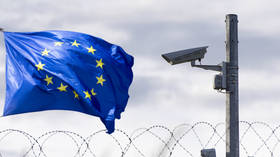US caught spying on EU ‘allies’ AGAIN…not like the Europeans will do anything about it

A new report alleging the US was spying on European leaders through Danish intelligence services is not the first of this kind. Washington has been caught before, but there’s no will in the EU to assert its independence.
According to a report in Danish media, the country’s intelligence services had been working at the behest of the notorious US National Security Agency (NSA) to spy on leaders throughout Europe, including Germany’s Angela Merkel. This is not the first time such allegations have been made, with the US having been accused of spying on Berlin in 2014 too. It’s also not the first time America used the Danish intelligence services as a medium – last year, a story surfaced claiming that Washington coordinated with them to spy on their own government in order to ensure Denmark would buy F-35’s as opposed to Eurofighters to replace its F-16s. In light of all these revelations, one has to question whether Denmark is truly even sovereign if its intelligence is de facto loyal to the US.
The surprising part about it is that none of these revelations are really new or unprecedented at all. It’s a well-established fact that the United States, despite calling them “allies” and embracing the rhetoric of “transatlanticism” openly commits espionage on Europe and treats its leaders with a fulcrum of political suspicion, as if they are paranoid that the European Union may make decisions against their interests. This is deeply ironic for an America which has strongarmed Europe arguing that Huawei, China and, of course, Russia, are all real “espionage” threats. But with Washington now caught, the real question is, what is Europe going to do about it? What will change?
Whilst the European Union talks of matters such as “strategic autonomy” and idealizes itself as a unified, independent force for good in the world, the reality could not be further from the truth. Espionage revelations are just the tip of the iceberg of a variety of ways in which the United States has, through its integration with Europe’s military and security dynamic, utilized a myriad of political tactics to strongarm the bloc into following its political will and agenda, even when it is apathetic or openly objects to it. The EU is ultimately just one institution amongst many on the continent competing for input on foreign policy agendas across 27 respective countries, which the US ultimately monopolizes through treaties, think-tanks, and discourse in the global media.
A very clear example of this is how the United States quickly drove a wedge between the EU and China when they sought to make their own separate treaty, the ‘EU-China comprehensive investment agreement’ (CAI), which Washington openly opposed. Whilst American opposition to it otherwise may have seemed irrelevant or barking on the sidelines, the Biden administration were able to utilize the Xinjiang issue to obligate the EU to “pick a side” on a matter of human rights and subsequently join in coordinated sanctions on the matter, which quickly soured relations as Beijing retaliated. Mission accomplished; Europe fell into the trap. One may ultimately describe America’s approach to European countries not as being driven by good faith or solidarity, but by ‘keeping it on a leash’. The dog may pull increasingly in another direction, but stays on the same path as its owner.
The espionage dynamic ultimately ties into the same mindset: The United States sees the European Union more as an economic competitor than as a friend and does not in any respect want it to get ahead of them or gain “advantage” in any specific area. The F-16 story above reveals how US intelligence in fact serves the interests of the military industrial complex, seeking out the secrets of Europe’s own defence industry and ensuring America always has the competitive edge, even to the point of making national intelligence agencies betray their own countries. As Edward Snowden stated in an interview in 2014, the US engages in constant industrial espionage against big German companies such as Siemens, stating: “If there’s information at Siemens that’s beneficial to US national interests – even if it doesn’t have anything to do with national security – then they’ll take that information nevertheless.”
In line with this, Angela Merkel, as a very Eurocentric leader who has a maverick approach to foreign policy and Germany’s place in the world, is unsurprisingly a frequent target of American intelligence activities. Washington is constantly wondering what she is thinking, intending and doing, not least regarding China and Russia where they do not see eye to eye. She is perhaps a “frenemy” to the US, a de facto ally and enemy simultaneously. But this all boils down to the big question as stated above, what is Europe going to do about it? Or can they do anything about it? The EU’s response to such unending controversies seems to be to make a small protest in the heat of the moment, but otherwise forget it and do nothing, passively tolerating American infiltration designed to undermine European interests and competitiveness across the board.
If Europe is serious about upholding its own “strategic clout” it has to be prepared to take bigger risks and stop being pressed into line under the obligation of “transatlaticism” and get tougher on the “American problem.” The bloc should take a leaf out of its rhetoric toward China and demand “reciprocity” in its relations with the United States, that it ceases espionage against them, seeks to curtail excessive “American influence” operations undermining their foreign policy and strategic independence and that it treats the continent as an equal and fair partner. Surely one would think ‘enough is enough’ but of course there is little reason to think anything will change. In a world where US surveillance is intrusive and rampant, America still surprisingly gets away with accusing everyone else of “spying.”
The statements, views and opinions expressed in this column are solely those of the author and do not necessarily represent those of RT.















